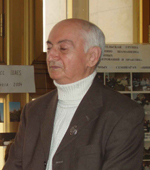 Prominent Russian ethnographer and researcher of Tuva Sevian Vainshtein has turned today 80. From early morning he has been receiving telephone calls from Japan to America - 57 all in all. People were congratulating him with the jibileum and wishing him health, love and long life. Prominent Russian ethnographer and researcher of Tuva Sevian Vainshtein has turned today 80. From early morning he has been receiving telephone calls from Japan to America - 57 all in all. People were congratulating him with the jibileum and wishing him health, love and long life.By the end of the birthday he has almost lost his voice and talked in a low whisper thanking a next telephone interlocutor. Vainshtein had gone a hard way to his scientific success. His father was repressed in 1936 and killed in 1938. Sevian was refused to get a higher education as a son of the 'people's enemy'. But his longing for knowledge helped him to overcome this barrier and he entered the most prestigeous University of Russia - Moscow State University (MGU-Russian). He has always been and is in the strive for justice. When a student he started his scientific activity and made a reseach trip to Kets, an ethnic minority in the Russian North. He was astounded at the poor condition of their life, they were on the brink of disappearing. Coming back to Moscow he decided to fight for Kets, made a report at the Ethnographic department of the MGU, wrote a letter to Grigori Malenkov, a prominent figure in the Russian Government. He was expelled from the MGU for the 'aspersions on the Ethnic Politics of Russia'. Only after interference of the special commission set up on Malenkov's initiative which went to Kets and studied their life conditions and confirmed Vainshtein's conclusions and recommendations to save Kets, he became again a student of the MGU. Over 50 years Vainshtein's life has been connected with Tuva. He has written fundamental works on the Tuvan culture, life in Tuva, its development. In September 2006 a scientific conference devoted to 80th anniversary of Sevian Vainshtein will take place in Kyzyl. Vainshtein's jubileum in Moscow will be celebrated on April, 20 in the Institute for Ethngraphic and Athropological research of the Russian Academy of Sciences where Vainshtein is still working.
|
